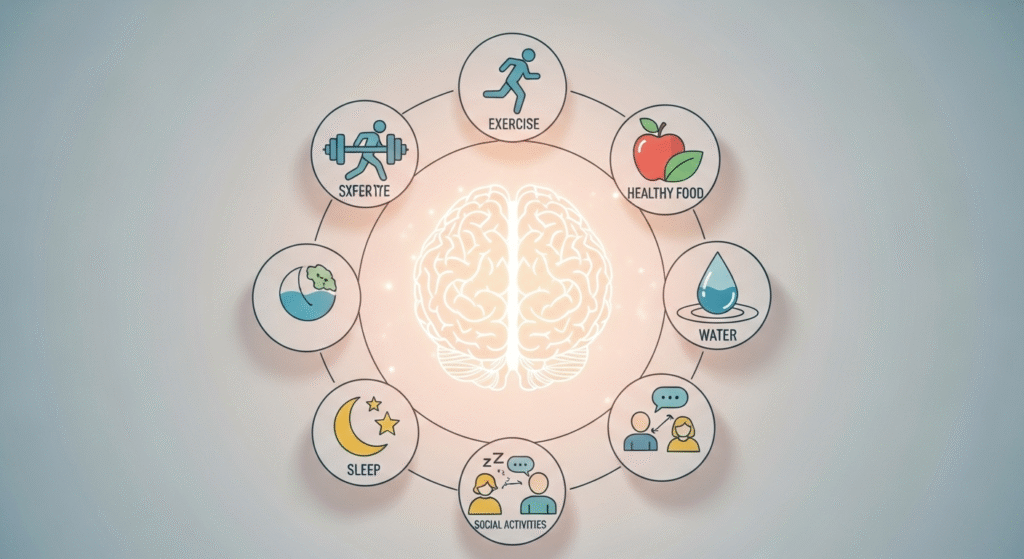As we grow older, maintaining mental sharpness becomes one of the biggest priorities for healthy aging. The good news is that brain health after 50 can be improved with everyday choices that enhance memory, focus, and emotional well-being. These small, consistent habits not only reduce the risk of cognitive decline but also help you enjoy a more fulfilling lifestyle. Let’s explore ten simple yet powerful habits that can keep your brain active and sharp well into your later years.

1. Stay Physically Active
Regular physical activity is one of the most effective ways to protect your brain. Exercise improves blood circulation, supplies oxygen to the brain, and stimulates the release of hormones that encourage new brain cell growth. Even light exercises like daily walking, stretching, yoga, or dancing can significantly lower the risk of dementia. Aim for at least 30 minutes of moderate activity most days of the week.

2. Prioritize Quality Sleep
Sleep acts as a natural reset button for the brain. It helps consolidate memories, process information, and clear out toxins that build up during the day. Poor sleep patterns after 50 can contribute to forgetfulness, mood changes, and slower thinking. To support brain health, establish a bedtime routine, avoid caffeine late in the day, and create a comfortable sleep environment. Seven to eight hours of quality sleep is ideal.

3. Eat a Brain-Boosting Diet
Your brain thrives on nutrient-rich foods. Omega-3 fatty acids from salmon and walnuts, antioxidants from berries, and vitamins from leafy greens all contribute to better memory and mental agility. Whole grains help maintain steady energy levels, while green tea can provide focus and alertness. Limiting processed foods, excess sugar, and unhealthy fats can also reduce brain inflammation that leads to decline.

4. Keep Learning New Skills
Your brain loves challenges. Engaging in new activities, such as learning a musical instrument, painting, or taking an online course, builds fresh neural connections and keeps your mind flexible. Puzzles, crosswords, and memory games are excellent tools for mental exercise. Think of your brain as a muscle—the more you challenge it, the stronger it becomes.
5. Stay Socially Connected
Human interaction plays a vital role in emotional and cognitive health. Studies show that people who maintain strong social relationships have sharper memory and lower rates of dementia. After 50, make an effort to connect with friends and family, participate in group activities, or join clubs that interest you. Social bonds reduce loneliness, stimulate conversation, and keep the brain engaged.

6. Practice Stress Management
Chronic stress releases hormones like cortisol, which can damage brain cells and shrink memory centers over time. Managing stress is therefore crucial for brain health after 50. Mindfulness practices such as meditation, deep breathing exercises, tai chi, or spending time in nature can help calm the nervous system. Setting aside even 10 minutes a day for relaxation can have lasting effects on your mental clarity.
7. Limit Alcohol & Avoid Smoking
Excessive alcohol consumption and smoking are harmful not only to the body but also to the brain. Both can accelerate memory loss and cognitive decline. Limiting alcohol to moderate levels and quitting smoking can significantly improve blood flow, oxygen levels, and brain function. Making healthier lifestyle choices can protect your memory and enhance long-term brain vitality.
8. Protect Your Brain
Head injuries at any age can have serious consequences, but after 50, recovery can take longer. Protect your brain by wearing helmets when cycling, using seatbelts while driving, and making your home fall-proof by keeping floors clear and well-lit. Preventing injuries is an often-overlooked but powerful way to safeguard brain health.
9. Stay Hydrated
Water plays an important role in maintaining focus, energy, and concentration. Even mild dehydration can cause headaches, fatigue, and confusion. As we age, the body’s ability to sense thirst decreases, making it easy to forget water intake. Keep a water bottle nearby and include hydrating foods like cucumbers, oranges, and watermelon in your diet.

10. Get Regular Checkups
Regular health checkups are essential in detecting conditions that can affect the brain, such as high blood pressure, diabetes, or thyroid imbalances. Managing these conditions early can prevent long-term damage. Don’t overlook hearing and vision tests either—both are linked to cognitive health since sensory input keeps the brain active and alert.
Final Thoughts
Your brain is your most valuable asset, and protecting it after 50 doesn’t have to be overwhelming. By incorporating these simple habits—staying active, eating smart, sleeping well, and staying socially connected—you can strengthen your memory, sharpen your thinking, and enhance your overall quality of life. The key is consistency. Every small step you take today contributes to better brain health tomorrow.

👉 Start with one or two of these habits and build your way up. Your future self will thank you.
